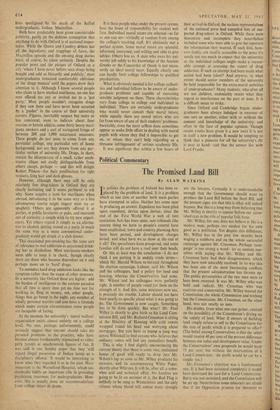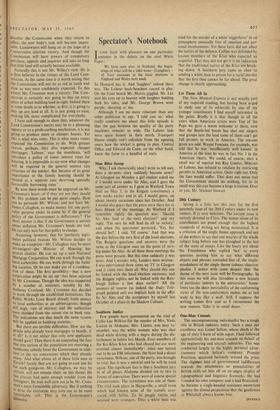Political Commentary
The Promised Land Bill
By ALAN WATKINS
TN politics the problem of Ireland has been re- 'placed by the problem of land. It is a problem which at one time or another both main parties have attempted to solve. Neither has come near to producing an answer. Expedient has been piled upon expedient, device upon device; since the end of the First World War a web of rent restriction Acts has been spun; rent tribunals (the nearest thing we have to people's courts) have been established; town and country planning Acts have been passed, and development charges levied; and what have we to show at the end of it all? The speculators have prospered, and some families still do not have a roof over their beads.
Or this at least was the conclusion-1 do not think I am putting it in unduly crude terms— which Mr. Harold Wilson re-iterated throughout the election campaign. Labour, said Mr. Wilson and his colleagues, had a policy for land and housing, whereas the Conservatives had none. Mr. Wilson and his colleagues were perfectly right. A number of people voted for them on the strength of it. And this, some ministers now say, is precisely the trouble. Labour should not have been nearly so specific about what it was going to do. The Government is now caught. Something has to be done quickly. But what? Mr. Fred Willey is shortly to give birth to his Land Com- mission Bill, and Mr. Richard Crossman is sitting at the Ministry of Housing with cold towels wrapped round his head and worrying about mortgages. But you have to tramp a long way across Whitehall to find anyone who believes that ordinary voters will feel any immediate benefit.
This is why I find slightly ,unconvincing the current theory that there is some vast, unclaimed bonus of good will ready to drop into Mr. Wilson's lap as soon as Mr. Willey produces his measure, and its accompanying White Paper, shortly after Whitson. It will be, after all. a some- what arid and technical affair. No bonfires are going to be lit on account of it, the Red Flag is unlikely to be sung at Westminster and the only citizens whose blood will course more strongly are the lawyers. Certainly it is understandable enough that the Government should want to produce the Land Bill before the Steel Bill, and the present signs are that this is what will indeed happen. But this is a long way from believing that Mr. Willey is shortly to appear before our aston- ished eyes in the role of popular folk-hero.
Mr. Willey, for one, does not believe it. He is a modest man, perhaps too modest for his own good as a politician. Yet despite this diffidence, Mr. Willey has in the past few months been waging a stubborn and on the whole successful campaign against Mr. Crossman. Perhaps 'cam- paign' is too strong a word: let us content our- selves with saying that Mr. Willey and Mr. Crossman have had their disagreements, which they have now amicably resolved. In its way this has been one of the most fascinating conflicts that the present administration has thrown up. The public personalities of the two men seem to have been reversed. it was Mr. Willey who was bold and radical; Mr. Crossman who was cautious and conservative. Mr. Willey wanted the Commission, the whole Commission and nothing but the Commission; Mr. Crossman, on the other hand, was not nearly so sure.
His doubts, from what one can gather, centred on the possibility of the Commission's drying up the supply of land. What if owners of building land simply refuse to sell to the Commission for the rate of profit which it is prepared to offer? (The belief among Conservatives is that the seller would receive 40 per cent of the present difference between use value and development value. Under the Conservatives' own proposals he would keep 75 per cent, but without the intervention of a Land Commission: the profit would be cut by a simple tax.)
Mr. Crossman's objection was a fundamental one. If it had been sustained completely it would have destroyed the case for a Land Commission. But it was not sustained, and the Commission will be set up. Nevertheless some ministers are afraid that if the Opposition promise (or threaten) to
dissolve the Commission when they return to office, the new body's task will become impos- sible. Landowners will hang on in the hope of a Conservative election victory. And though the Commission will have powers of compulsory purchase, appeals and inquiries will take so long that little land will actually become available.
Naturally this is not Mr. Willey's view. He is a firm believer in the virtues of the Land Com- mission. At the same time it is worth noting that the Commission will not be as red in tooth and claw as was once confidently expected. To this extent Mr. Crossman won a victory. The Corn- mission is certainly not going to buy up every Piece of urban building land in sight. Indeed there is some doubt as to whether, at first, it is going to by up any land at all. It is just going to exist, making life more complicated for everybody.
I have said enough to show that, whatever the Land Commission's merits may be as a planning agency or as a profit-curbing mechanism, it is not going to produce more or cheaper houses. Yet this is what wins votes. This is what many voters expected the Commission to do. With greater reason, perhaps, they also expected cheaper mortgages. 'Labour,' says the manifesto, 'will introduce a policy of lower interest rates for housing. It is impossible to say now what changes Will be required in the general interest rate structure of the market. But because of its great importance to the family housing should be treated as a separate case deserving specially favourable borrowing rates' By now these words must be engraved on Mr. Crossman's heart; or if they are not they should be. His problem can be put quite simply. How can he persuade Mr. Wilson, and not least Mr. fames Callaghan, to make money for one parti- cular purpose easier to come by if the general Policy of the Government is deflationary? The short answer is that if the Government is serious about deflation Mr. Crossman's hands are tied. He can only wait for that policy to change.
Assuming, however, that for (perfectly legiti- mate) political reasons Mr. Wilson decides to Make an exception—Mr. Callaghan maybe more intransigent—the Minister of Housing has several choices. He can set up a new National Mortgage Corporation. He can work through the local authorities. He can work through the build- Mg societies. Or he can make use of a combina- tion of these. The first possibility— that a new corporation might be set up--has been rejected by Mr. Crossman. Though the idea was supported by a number of ministers, notably by Mr. Anthony Crosland, Mr. Crossman has decided
to work through the established institutions. The Public Works Loan Board already lends money to local authorities at an advantageous, though still high, rate of interest; and the authorities Were shielded from the recent rise in bank rate. The indications are that much the same system will be applied to building societies.
But there are terrible difficulties. How are the People who already have mortgages to benefit, if at all? Is it not unfair that only new applicants should gain? Then there is no concealing the fact that one section of the population are receiving a handsome subsidy from the Government in addi- tion to the tax concessions which they already enjoy. And what above all of those little men in Zurich? Surely they are not going to care one bit for such goings-on. Mr. Callaghan, we may be certain, will not remain silent on this theme. He has already had quite enough trouble from the
foreigners. He may well turn out to be Mr. Cross- man's most formidable adversary. But if nothing 1,,s done the electorate may turn out to be more formidable still. That is the. Government's dilemma.































 Previous page
Previous page